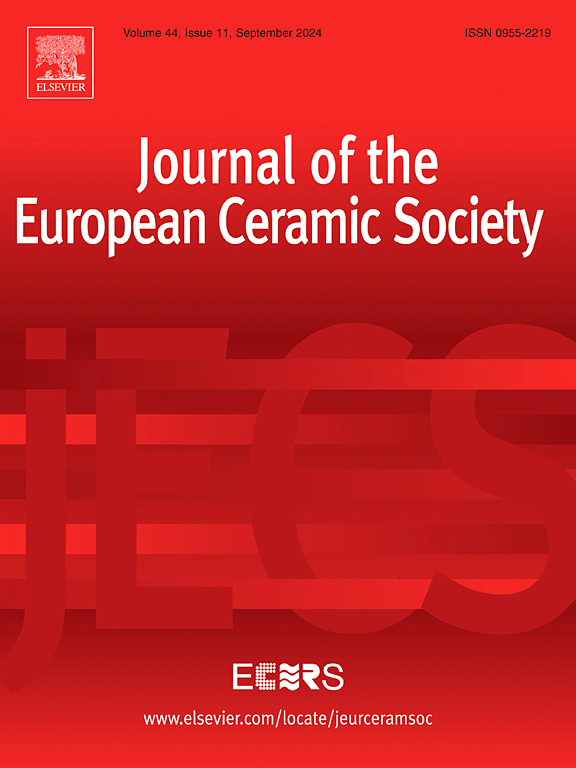MnO2 含量对固态晶体生长法制备的 c 向 0.85(Bi0.5Na0.5)TiO3-0.15BaTiO3 单晶的生长和电学特性的影响
IF 5.8
2区 材料科学
Q1 MATERIALS SCIENCE, CERAMICS
Journal of The European Ceramic Society
Pub Date : 2024-10-31
DOI:10.1016/j.jeurceramsoc.2024.117043
引用次数: 0
摘要
<110>采用固态晶体生长方法制备了面向c的0.85(Bi0.5Na0.5)TiO3-0.15BaTiO3 + x wt%MnO2(x = 0 - 0.5)单晶,并研究了MnO2含量对晶体生长和电性能的影响。在 x = 0 - 0.1 时,获得了尺寸约为 2 mm×3 mm×0.4 mm 的单晶体。在 x = 0 - 0.1 条件下,单晶体介电性能的温度依赖性显示去极化温度为 218 - 220 ˚C,最大介电常数温度为 254 - 261 ˚C。在 x = 0.1 时,观察到铁电极化-电场环和应变-电场曲线,压电常数 d33 为 118 pC/N。d33 值大于已报道的 <110>c 型陶瓷,但小于 <001>c 型陶瓷,这表明 0.85(Bi0.5Na0.5)TiO3-0.15BaTiO3 是一种扩展铁电材料。本文章由计算机程序翻译,如有差异,请以英文原文为准。
Effect of MnO2 content on the growth and electric properties of <110>c-oriented 0.85(Bi0.5Na0.5)TiO3-0.15BaTiO3 single crystals fabricated by solid-state crystal growth method
<110>c-oriented 0.85(Bi0.5Na0.5)TiO3-0.15BaTiO3 + x wt%MnO2 (x = 0 – 0.5) single crystals were fabricated by a solid-state crystal growth method, and the effect of the MnO2 content on crystal growth and electric properties were investigated. Single crystals with a size of about 2 mm×3 mm×0.4 mm were obtained at x = 0 – 0.1. The temperature dependence of the dielectric properties of the single crystals at x = 0 – 0.1 revealed depolarization temperatures of 218 – 220 ˚C and the temperatures of the maximum dielectric constant of 254 – 261 ˚C. At x = 0.1, a ferroelectric polarization – electric field loop and a strain – electric field curve were observed, and the piezoelectric constant d33 was 118 pC/N. The d33 value was larger than to that of reported <110>c-oriented ceramics but smaller than <001>c-oriented ceramics, which suggested that 0.85(Bi0.5Na0.5)TiO3-0.15BaTiO3 was an extender ferroelectric material.
求助全文
通过发布文献求助,成功后即可免费获取论文全文。
去求助
来源期刊

Journal of The European Ceramic Society
工程技术-材料科学:硅酸盐
CiteScore
10.70
自引率
12.30%
发文量
863
审稿时长
35 days
期刊介绍:
The Journal of the European Ceramic Society publishes the results of original research and reviews relating to ceramic materials. Papers of either an experimental or theoretical character will be welcomed on a fully international basis. The emphasis is on novel generic science concerning the relationships between processing, microstructure and properties of polycrystalline ceramics consolidated at high temperature. Papers may relate to any of the conventional categories of ceramic: structural, functional, traditional or composite. The central objective is to sustain a high standard of research quality by means of appropriate reviewing procedures.
 求助内容:
求助内容: 应助结果提醒方式:
应助结果提醒方式:


